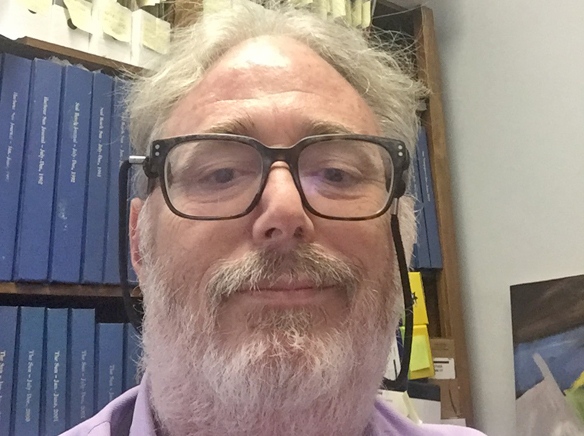Editor’s note: This article has been edited to correct typos that appeared in the print edition.
1986: My first assignment for the Daily Forty-Niner (CSU Long Beach) was to cover the shipment of spent nuclear rods to Long Beach Harbor. (Perfect assignment for a student reporter with no background in either science or government.) One day I phoned a Harbor Department official about the continuing controversy. I no longer remember the original questions, but I followed up one of his answers by asking “why?”
He said in a stern tone that he would not answer follow up questions.
As I continued through my list of prepared questions, I wrote a 10-word variation on “why” on a separate sheet of paper.
That question, he answered.
If a door closes, throw yourself at the door until you force it back open.
1988: I phoned anyone I could think of, groping desperately for a starting point to my assignment.
I had to write at least three in-depth stories for “Reporting Urban Problems” or re-take the class the following year. But I’d been sick for the first week of the class, so I was already behind schedule and would have less time than my classmates to complete the first assignment. And the assignment had to be related to gangs because the Daily Forty-Niner was doing a special section about gangs. The deadline was fixed.
I had to do this assingment as well as write daily news stories for the Forty-Niner and serve as the DFN’s librarian, as well as attend non-journalism classes.
Biggest problem: My story idea was vague—something about gangs and religion. I pitched the notion based on my memory of reading “The Cross and the Swtichblade” when I was 14. Vague ideas are harder to research. (Yet a vague premise is less likely to influence your research.) No one had high expectations for my proposal, but the force of the deadline prompted its approval.
I called the pastor of Inner City Ministries in Long Beach. (Turns out he’s still ministering.) The initial interview was unfocused. At some point, I asked what denomination he represented. He said, “I’m a Quaker.”
“I thought the correct term was ‘Friend,’” I said.
“Oh, you have knowledge!”
He drove over to Cal State Long Beach a few days later and that interview helped me continue my research. Even so, after three weeks of interviews (including a late night chat with a Catholic brother), I still had no idea how to focus the story until the last day before the story was due. On that day, I scored three more interviews on a Sunday afternoon. Those interviews brought everything into focus. I spent two hours that night wrestling with the opening and spent the next four hours or so serving as a mere conduit for the information I had gathered. The story “wrote itself.” (This semi-divine experience happens two or three times in a writer’s life. I’m aiming for one more before I check out.)
“Gang ministry rehabilitates, offers hope” earned me credit for two “A” grade stories, and a spot on the front page. A month later, it was forgotten.
Knowledge begets knowledge. And when in doubt, keep interviewing.
2009: I was interviewing a different pastor for the Sun when he asked me about my religion.
I stopped taking notes. The interview was a direct assignment from my publisher. We were supposed to be talking about his goals.
How was I to answer his question? Should I answer? When I was young, people didn’t talk about sex, politics, or religion.
Courtesy demanded a reply. So did getting the job done. But I felt squeezed, trapped.
Personal note: When my father was a boy, one of his Protestant uncles gave him a pamphlet that said Catholics were awaiting orders from the Pope to violently overthrow the United States. His Catholic grandmother—my great grandmother—had to explain to my father that his uncle was an anti-Catholic bigot (and a fool). Religious questions make me uncomfortable.
Which brings us back to that awkward moment in 2009.
I didn’t want to risk offending a man I was interviewing.
I couldn’t ask him to be honest with me if I wasn’t being honest with him.
What would you do? Go on, think about it.
Done? Here’s what I did:
I said I was reluctant to answer the question because sometimes the reaction was not as polite as I’d expect it to be.
The pastor was visibly startled. He wanted this interview to succeed. It turned out he was unfamiliar with my church.
I then told the minister what little I recalled about the church of my youth, including the fact that there was a significant disconnect between what seminary students were taught and what the laity believed. (This I gather is normal in most churches.)
After this detour, we returned to the focus of the interview.
If you don’t see a safe exit, take a deep breath and do the best you can.
Charles M. Kelly is associate editor of the Sun. Ask him almost anything—except to blow a deadline.










